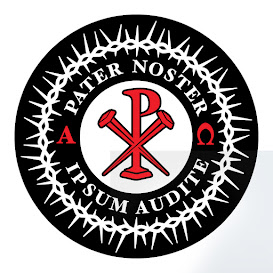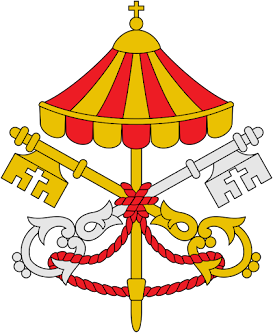Luk 19:39 Enige farizeën uit de menigte zeiden tot Hem: Meester, breng uw leerlingen tot bezinning.
Luk 19:40 Maar Hij gaf hun ten antwoord: Ik zeg u: Als zij zwijgen, dan zullen de stenen gaan roepen.
En inderdaad:
LifeSiteNews, het grootste Amerikaanse, Katholieke persagentschap, veegt de vloer aan met de hervorming van het Onze Vader in het Nederlands door de Vlaamse en Nederlandse 'bisschoppen'!
Dutch Catholics raise alarm after bishops ‘update’ words of the Our Father
November 30, 2016 (LifeSiteNews) – Dutch Catholics are raising alarm bells after the bishops of the Netherlands and Belgium changed the words to the Our Father in a way that they believe amounts to an "ideological reinterpretation of the text."
Dutch Catholics who still attend weekly Mass heard a newly-worded Our Father last Sunday that no longer asked God the Father, as Jesus taught, “to lead us not into temptation” but, instead, “not into trial.”
Vox Populi, an orthodox Catholic lay group, is organizing a petition advocating the traditional translation. “Why would this ‘reform’ be necessary now? There is not a single pastoral need to come up with a ‘new common Dutch-Flemish translation’ of the ‘Our Father.’”
Recent Dutch Catholic history is so marked by destructive innovation that in 1996 one faithful scholar declared the situation had long passed the “crisis” phase and achieved “ruin.”
The former translation of the Latin “temptationem” was “bekoring” or “temptation.” The new version replaces that with “beproeving,” which means in English, “test,” “ordeal,” or “tribulation.”
Image
Dutch pro-life leader Hugo Bos said the switch is “a bad thing," but is “consistent with a tendency of the bishops to ignore sin and the temptation to sin.”
Indeed, it is the latest in a trend established by the 1965 “Dutch Catechism,” which systematically stripped the supernatural from Church teachings in “the spirit of Vatican II.” No church embraced this “spirit,” and its desire to bring the Church into a positive encounter (“aggiornamento”) with popular culture more than the Dutch.
Vox Populi warns, however, that this latest “initiative of the Belgian and Dutch bishops will only add to the confusion within the Church and thereby increase the crisis of faith.” Going back to the Greek version of the Our Father, which uses “peirasmos,” the critics of the translation admit that theoretically it “can be translated as either ‘trial’ or ‘temptation.’ However, within the context of the 'Our Father,' ‘peirasmos’ cannot be translated as ‘trial.’”
Vox Populi points out that the Catechism of the Catholic Church makes it crystal clear that the phrase is intended by Jesus Christ as a plea for help in resisting the temptation to sin, not a request for God to avert pain and material suffering. Sections 2846, 2847 and 2848 of the Catechism focus on moral temptation. Vox Populi illustrates the difference with a picture of a comely woman labeled “temptatio” and of a forlorn and wasted Job-like male figure captioned “probatio.”
The mistranslation will surprise no one who has observed the steady liberalization of the Dutch church. As reported in a 1996 presentation by J.P.M. van der Ploeg, a professor of Old Testament Studies at the Catholic University at Nijmegen, its first outward manifestation came with the Dutch Catechism, which, he said, simply removed the supernatural element from the Church. God was manifest not in sacraments, not in the Eucharist, but simply in good deeds.
The Holy Mass became “the service,” the “priest” became “the one who presides at the service,” and Baptism was simply the signifier of membership rather than the sacrament where God filled the child with supernatural grace.
Rome ordered a revision that the Dutch bishops defied. In the spirit of disobedience that followed, “priests, influenced by Modernism, began to teach the faithful that many things which they had hitherto been taught were not true. The stories of Adam and Eve in Paradise, of Original Sin, the Flood, Noah and his animals in the ark, the passing of Israel through the Red Sea, were said to have no historical foundation.”
A new Biblical translation followed in colloquial language that was necessitated, said its translators, by recent and rapid changes in the Dutch language. These were bogus, said Fr. van der Ploeg. The new translation’s introduction flatly denied the historicity of the first three books of the Old Testament.
“The moral teaching of the Church was said to be antiquated and not relevant to the needs of modern man. The bombardment was continuous. For many people, it had always been difficult to be chaste in all the circumstances of life; now it was claimed that God did not require chastity.” Concluded Fr. van der Ploeg: “All these things taken together contributed to the development of the present situation — no longer one of crisis, but of ruin.”
That ruin was manifested by 2013 in the systematic closure of churches. As reported three years ago by LifeSiteNews, “600-700 Catholic churches in the Netherlands will be decommissioned by 2018.” In the same story, Dutch Cardinal Willem Jacobus Eijk recalled that 90 percent of Catholics attended Sunday Mass before Vatican II. But now, it was just 6 percent.
Enough is enough, says Vox Populi. “The truth is that we are not dealing with a newer or better ‘translation’ here, but rather an ideological reinterpretation of the text. Therefore, Vox Populi calls upon the Episcopal Conferences of Belgium and the Netherlands to abandon this experiment doomed to failure with the ‘Our Father’ and to maintain the existing situation.”
Bron: LifeSiteNews
Link:
https://www.lifesitenews.com/news/dutch-catholic-church-replaces-temptation-with-trial-in-our-father-prayer
'BEKORING' IS NIET HETZELFDE ALS 'BEPROEVING'!
EEN 'BEKORING' KOMT VAN DE DUIVEL!
EEN 'BEPROEVING' KOMT VAN GOD!
 |
| Link: http://www.katholiekforum.be/index.php/2016/11/23/persbericht-het-nieuwe-onze-vader-is-in-tegenspraak-met-de-catechismus-van-de-katholieke-kerk/ |
































5 opmerkingen:
Leid ons niet in bekoring.Tot wie wordt deze zin gericht? Tot Onze Vader, God. Volgens u is God de duivel.
@ Vorige Anoniem,
Ten eerste zou elke Katholiek op zijn hoede moeten zijn, wanneer na 2.000 jaar, de Vlaamse en Nederlandse 'bisschoppen', die toch niet bekend staan als zijnde pilaarbijters, de woorden van het Onze Vader veranderen.
Ten tweede vraagt de bede 'En leid ons niet in bekoring' God om iets niet te doen, om iets niet toe te laten.
Ten derde, 'breng ons niet in beproeving' is satanisch omdat wij God zouden vragen om ons niet te beproeven, terwijl beproevingen net noodzakelijk zijn om in de hemel te komen. Het lijden is noodzakelijk om gered te worden.
Ten vierde, God bekoort ons niet, dat is de duivel. Daarom bidden wij en vragen wij aan God om de duivel niet toe te laten om ons te bekoren. Dit is perfect logisch!
Ten vijfde is het God die de duivel toelaat om ons te bekoren.
Ten zesde gaat de bekoring over de toestemming die wijzelf, via onze vrije wil, geven aan het kwade.
Ten zevende is het gevolg van een bekoring de zonde en ontstaat er een schuld tegenover God.
Ten achtste vragen wij in de vorige bede: "En vergeef ons onze schulden" die het gevolg zijn van de bekoring!
Ten negende, een beproeving geneert niet per se een zonde. Wanneer je huis afbrandt, dan is dat géén bekoring, maar een zware beproeving. Echter, wanneer het huis afbrandt, hebben wij daar geen schuld aan en genereert dat ook geen zonde! Wanneer men seksuele zonden plegen, gebeurt dat via de bekoring, omdat net een bekoring verlokkelijk is.
Ten tiende is het uiteindelijk God, die de duivel van ons af kan houden.
Bidden tot God helpt volgens uw uitleg dus niet. Als ik Hem vraag om de duivel niet toe te laten om mij te bekoren (4) en God laat de duivel toe mij te bekoren (5), dan heeft het geen zin tot God te bidden
@ Vorige Anoniem,
Als u er zo over denkt, dan heeft bidden inderdaad géén zin.
Indien u God om een gunst zou vragen, zal God u deze gunst verlenen, niet omdat u bidt, maar omdat u gelooft.
Om goed te kunnen bidden, is Geloof noodzakelijk.
Maar, het Geloof is zelf ook een Gave.
Om die Gave te verkrijgen, moet men eerst bidden en er open voor staan.
Mar 11:22 Jesus gaf hun ten antwoord: Hebt Godsgeloof!
Mat 17:19 Nu kwamen de leerlingen afzonderlijk bij Jesus, en zeiden: Waarom konden wij hem niet uitwerpen?
Mat 17:20 Jesus sprak tot hen: Om uw gebrek aan geloof. Voorwaar, Ik zeg u: Zo gij een geloof hebt als een mosterdzaadje, dan zult gij zeggen tot deze berg: Ga van hier dáár heen, en hij zal gaan; en niets zal u onmogelijk zijn.
Mat 17:21 Maar dit soort wordt alleen uitgedreven door gebed en vasten.
Mar 11:23 Voorwaar, Ik zeg u: Zo iemand zegt tot deze berg: Hef u op, en werp u in zee; als hij niet twijfelt in zijn hart, maar gelooft, dat er gebeurt wat hij zegt, dan zal het gebeuren.
Mar 11:24 Daarom zeg Ik u: Zo gij iets vraagt in het gebed, gelooft dan, dat gij het verkrijgt; en gij zult het verkrijgen.
Mar 11:25 Maar wanneer gij staat te bidden, en gij iets tegen iemand hebt, vergeeft het dan: opdat uw Vader, die in de hemel is, ook u uw zonden vergeeft.
En deze is nog voor de meelezende 'bisschoppen':
Mat 13:40 Zoals dus het onkruid verzameld en in het vuur wordt verbrand, zo zal het ook geschieden aan het einde der wereld.
Mat 13:41 De Mensenzoon zal zijn engelen zenden. Ze zullen uit zijn rijk alle ergernisgevers verzamelen, en hen die ongerechtigheid plegen,
Mat 13:42 en ze in de vuuroven werpen; daar zal geween zijn en gekners der tanden.
Aan anoniem 11 december 2016 12:54
U schijnt mij helemaal op de heidense trant van de oude romeinen geland te zijn.
Zeer simplistisch gaat U uit van het idee "Do ut des"-"Ik geef opdat Gij mij moogt geven":
een soort warenruil waar men voor een bpaald gebed iets kan terugkrijgen.
Wij biden dat God ons niet in de situatie van de bekoring moge brengen, omdat wij zwak zijn, de uiterlijke schijn en bekoring willen genieten en daardoor de onderliggende hoogmoed en rebellie tov. God bij het begaan van zonden willen ogenschijnlijk verdringen/vergeten.
De vrije wil, het vrije oordeel, kan zich echter alleen tonen door de keuze te maken tussen goed en kwaad.
Hoe U nu oordelen wil dat het geen zin heeft om tot God te bidden?
Dat is weer eens noordbelgische modernistischkerkelijke hoogmoed.
Ik bid tot God omdat ik moet, niets anders kan bij mijn menselijke beperkingen, fouten en zonden en tegenover Zijn almacht, Zijn liefde, Zijn werken.
Hij is alles, wij zijn niets.
De katechismus heeft de "zin" dan ook zeer kort en bondig omschreven:
"Waarom is de mens op aarde?
Om God te zoeken, om Hem te vinden in Zijn werken en te loven in eeuwigheid".
De noordbelgische bastaardkerkers zijn inderdaad helemaal van het geloof afgevallen.
Een reactie posten